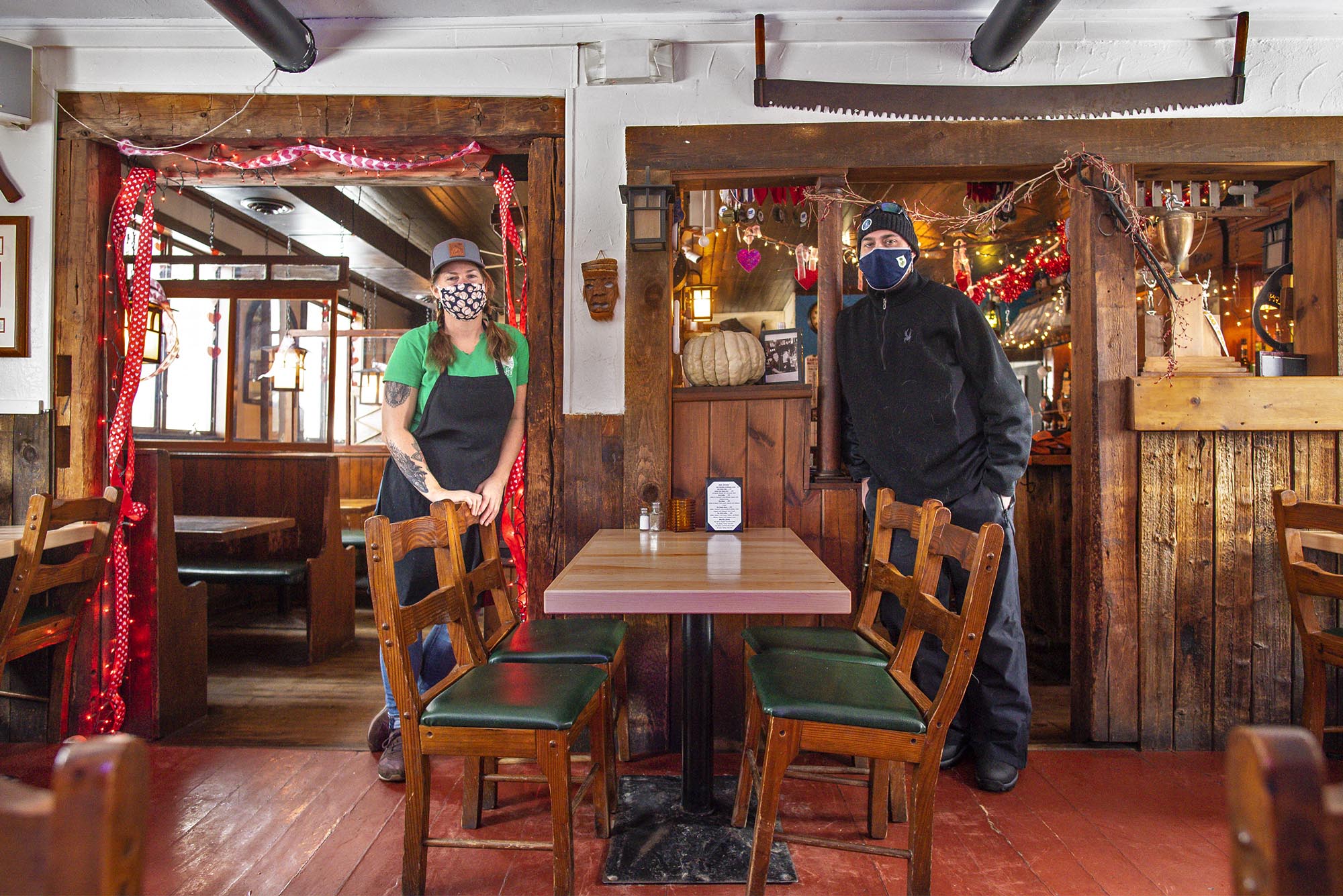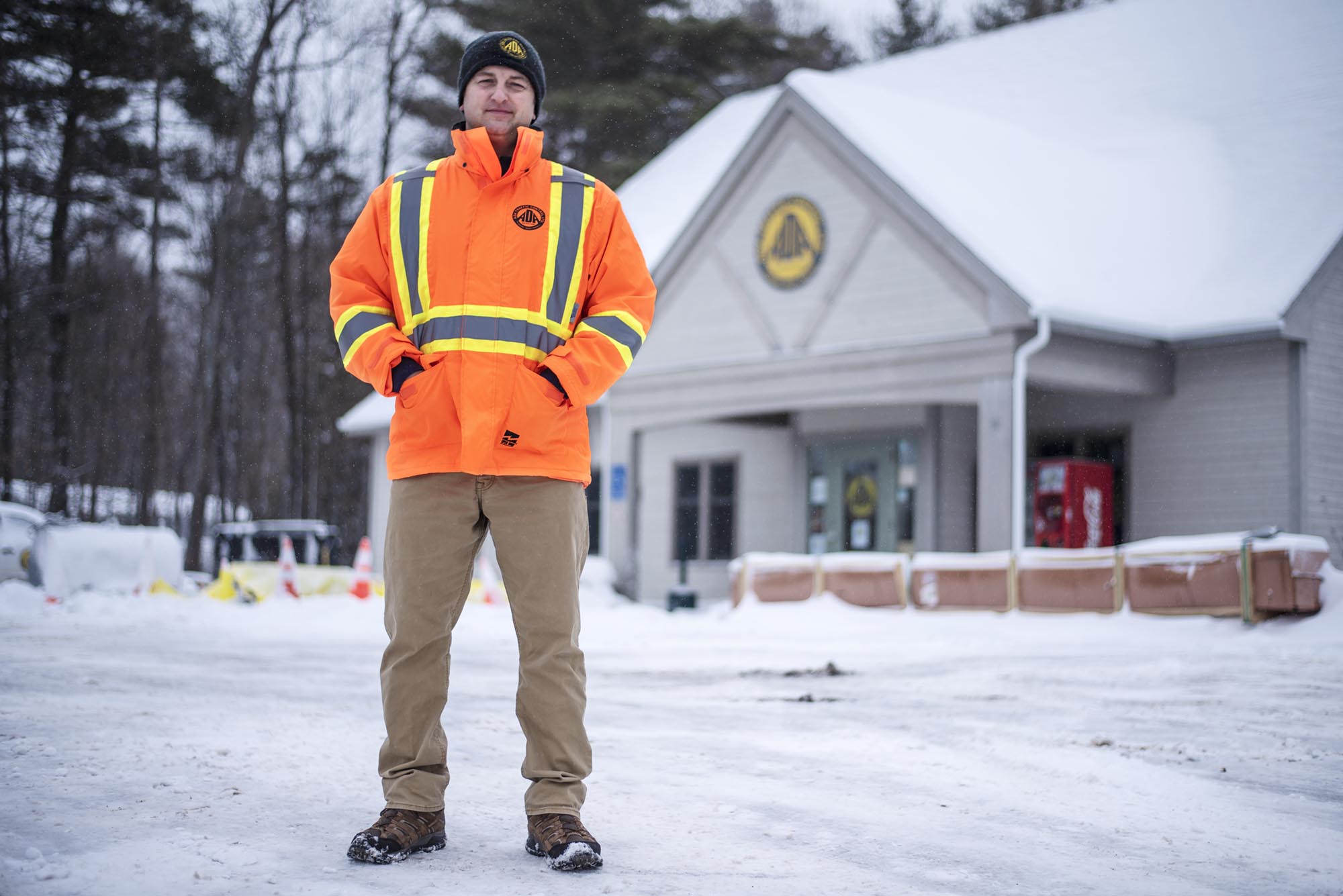
Within days of the coronavirus first appearing in Vermont, the governor closed all Vermont restaurants to indoor dining, dropping revenues to nearly zero.
At the time, Dennis Himes and Sam Thompson had operated the Belfry, a restaurant in Montgomery Center on the Canadia border, for less than a year.
As new business owners, the pair weren’t eligible for some of the grant programs that required applicants to show revenues from the full year before. Meanwhile, Himes’ other source of income, managing the ice rink at nearby Jay Peak, all but vanished as the state put a stop to group recreational gatherings.
Suddenly, the two were following news updates more closely than ever before. Himes had free time for the first time in years. The pair watched the news as the Canadian border closed March 23, dealing a major blow to the Jay Peak area. The state released a map showing which areas visitors could enter Vermont without quarantine, putting a damper on an ordinarily large base of out-of-state business.
While the recent return of high school hockey will make a big difference to the bottom line at the rink, the couple’s financial future is still uncertain.
It’s difficult to find a business owner who hasn’t been permanently changed by the events of 2020. While profits rose for some — such as outdoor equipment retailers and gardening-related businesses — others say that, despite an array of federal and state grants, they’re going to come out behind this year.
In a normal environment, businesses rely on a stable future so they can plan and invest. But financial uncertainty has been the name of the game for most in Vermont for nearly a year now.
CPA Practice Advisor, the public accounting publication, puts it this way:
“In 2020, growth has been replaced by survival for many companies.
“For the fortunate that are surviving, the next questions are coming fast and furious: What are you going to do in 2021 for hiring and expansion? Will you be cautious and lock all non-discretionary spending? Will you plan for minor expansion or will you be bullish on your prospects during an anticipated recovery?”
VTDigger spent time with the decision-makers at three Vermont businesses to see how they’re weathering the storm.
Crisis ‘gives you confidence’

The bar at the Essex House restaurant in Island Pond is typically packed on a weekend night in snowmobile season, with visitors three-deep at the bar. The restaurant and attached hotel serve as a hub of sorts in a town that is known regionally for snowmobiling.
This year the action has moved outside. With Covid-19 restricting how many people could gather inside, last summer Melinda Gervais-Lamoureux and Dave Lamoureux built a canvas pavilion with picnic tables so the socializing could continue, at a distance.
The 780-square-foot pavilion has a roof and some propane shop heaters. For snowmobilers, who are generally dressed warmly to begin with, it’s a place to order drinks, pick up takeout food, or wait for a reservation, said Gervais-Lamoureux.
“If it’s 50 degrees in there, you have your snowmobile pants on, so you can still be there comfortably,” said Gervais- Lamoureux, “We still have to follow all of the guidelines. But if you’d like to go outside and have a drink, you can go to the Pavilion.”
The pair bought the largely dormant Essex House for just $115,000 in 2016, and estimate they have put $300,000 into it since then. They also own an Island Pond housing complex for the elderly, Sunrise Manor.
Before the pandemic, they had 26 people working in the restaurant, and two more in hotel housekeeping. The bar was standing room only, and it was not unusual to have 75 snowmobiles in the parking lot on a winter night, said Gervais-Lamoureux.
“Three restaurants could survive in island Pond” in winter, she said. “It’s been named the snowmobile capital of Vermont, which it most likely is.”
The roadside Essex House building, which includes 11 hotel rooms and an indoor restaurant capacity of 125 in normal times, spans the Clyde River, and the two had always planned to put in some outdoor seating to take advantage of the riverbank location.
The pandemic just accelerated the timeline for that work. The timing of the pandemic’s start — restaurants were ordered to close to all but takeout on March 17 — made it easier, Lamoureux said. The two decided they weren’t set up for takeout. Although restaurants were cleared for limited indoor dining in early June, they didn’t open right away.
They stayed closed until mid-June, using a Paycheck Protection Program loan to pay employees and create a riverside dining area for the summer, where they had live music, picnic tables and, in the fall, propane heaters. They added planter boxes and flowers.
“It was busy and it saved us,” said Gervais-Lamoureux.



This winter, the place is busy once again. Where they used to be open seven days a week, they’re open only five now. After the pandemic, they expect to hang on to many of the changes they’ve adapted to as a result of Covid-19, like using iPads instead of paper for taking orders.
“We got more modern,” said Dave Lamoureux.
“Anytime you can get through a challenging situation, it builds upon you and gives you another stone to step to,” he said. “It gives you confidence that you can handle other situations that might arise.”
Covid grants ‘saved the company’

March is usually the time of year when Patrick Murphy, a co-owner of ADA Traffic Control, dispatches workers to haul traffic-control signs from the company’s warehouse and place them on roads as construction projects get underway.
Last year, as Covid-19 put a stop to construction work in mid-March, Murphy had to ask those workers to turn around and put the signs back. Like others, the company then went largely dormant for several weeks as the economy adjusted to business stoppages and other changes prompted by the pandemic.
But things picked up quickly, just in a different way. Construction companies were among the very first businesses to get back to work, so the signs went back out on the road. Security services — one of four separate businesses that ADA operates — were in high demand as hospitals and health care centers prepared for the unknown. The traffic control side — the heart of the business — also bounced back. Only private investigations — a part of the business that Murphy’s father runs — stayed closed.
Nearly a year later, Murphy said it’s too early to assess the impact the pandemic has had on the family-owned business, but he knows that a federal Paycheck Protection Plan loan for $1.6 million last year has kept the company in the black.
“The only reason we ended up being OK at the end of the year was because of PPP,” Murphy said.
ADA Traffic Control got its start when Murphy’s father retired as a sheriff in 1994 and opened the Associated Detective Agency, or ADA. But as many sheriffs do, Murphy said, he got a lot of requests to provide both traffic control and private security services.
“I was the very first traffic-control flagger at the company,” said Murphy, who was 16 at the time. Now the Colchester-based ADA employs 250 flaggers in a normal summer. The company then picked up business selling and renting the signs used for traffic control.
After the initial lull caused by the Covid shutdowns, much of the state’s construction business quickly returned to normal, said Murphy. By midsummer, he was blaming the federal government’s $600 supplement to weekly unemployment insurance payments for turning hiring into ADA’s biggest challenge.
“People were telling me, ‘Why would I go do that when I am literally making $1,000 sitting at home?’” he said. “Traffic control is hard work. It’s very tough on the body and tough on the mind. You are physically and mentally exhausted at the end of the day. To ask people to give up $1,000 to work 50 hours a week in the hot sun and rain, it’s a tough sell.”
However, the demand for private security was robust at hospitals and other health care centers, he said.
“It was scary times, and the hospitals didn’t know how many people they were going to be getting,” he said. “There was a lot of mental health stuff at the hospital we were there for.”
Working remotely, Murphy misses the personal visits to customers. He said his father built the business by visiting contractors in person to thank them personally for hiring him, or to resolve conflicts that came up on job sites.
“The world has gone to this electronic communication and it affects how you handle conflict, how you handle business relationships,” he said. “We always used to go in and say, ‘Let’s talk,’ and that’s all gone now.”
From two jobs to furloughs
Dennis Himes had two jobs when the pandemic hit, and the shutdowns took a bite out of both.
Himes had been managing the ice rink at the Jay Peak ski resort, and he and his wife had taken ownership of the Belfry, a 40-year-old restaurant and bar, in May 2019. But Himes was furloughed around March 16 from the rink, and the restaurant, like others in the state, was ordered to close.
“I’m used to working all the time, so it’s been tough on me mentally,” said Himes, who used to get up at 6 a.m. to work at the rink, and then move to his second job at the restaurant and stay there into the night. He said he’s slowly getting accustomed to drinking his coffee while sitting on the couch in the morning. “I don’t know what to do with myself now.”
But Himes and his wife, Sam Thompson, consider themselves lucky. When they reopened the restaurant in the spring, they were able to add outdoor seating, and with help from a Paycheck Protection Program loan, they kept going through the summer and fall.
“The end of summer was great for us, because we have a lot of outdoor seating,” said Himes. The restaurant normally has a capacity of about 56 people indoors, and 50 more outdoors. Restaurants — which had earlier seen some return to normal and a relaxation of distancing rules — were limited to 50% capacity when Vermont’s Covid-19 case numbers started climbing again in the fall.
The couple purchased a tent last summer; now, they plan to buy another one and pour a concrete slab to create more outdoor seating.
Thompson said local support for the 40-year-old restaurant has helped.
“A lot of locals would buy gift certificates to use at a later date, and they still haven’t cashed those gift certificates in,” she said. “People have been very generous with tipping.”
As for the hockey, Himes doesn’t expect that to return to normal until next fall. While he still gets requests for multifamily parties there, under state regulations, only one family at a time is allowed.
“Out-of-staters have a hard time understanding the guidelines,” he said. “I get the same thing: ‘Well, in Massachusetts, we can play hockey, we can do this, we can do that.’ I keep explaining to them that obviously every state has got different rules, and for our rules it’s single-family households.”
But part of Himes’ compensation comes from the business he brings in, like the 40 hockey tournaments a year that used to play there.
“That business has evaporated,” he said.

